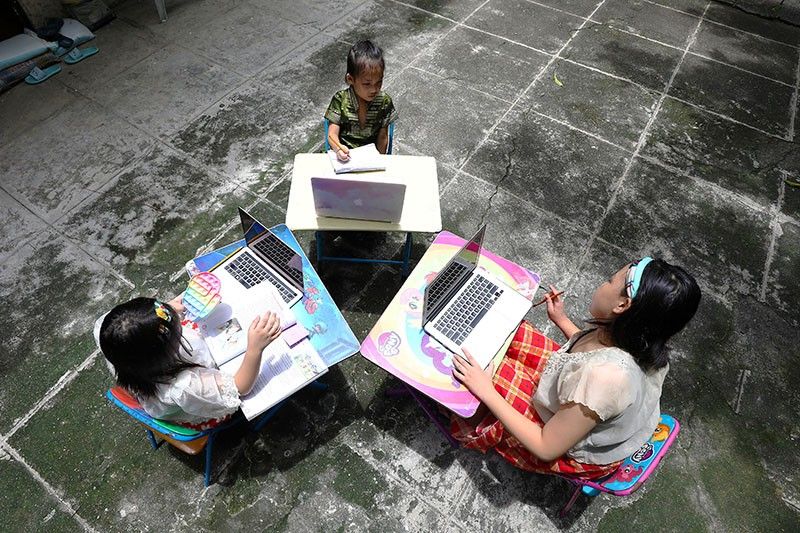Commentary: The COVID-19 slide and the digital divide

COVID-19 has forced schools in the Philippines to remain closed for the second straight school year. With face-to-face classes prohibited, students continue their learning through online classes and self-learning modules.
Many are concerned, however, over learning loss and the potential long-term negative impact of prolonged school closure, unequal access to learning resources, and the quality of self-learning modules.
According to the World Bank, “evidence is emerging to show that school closures have resulted in actual learning loss – a ‘COVID slide.’”
COVID slide refers to learning loss or the reversals in academic progress brought about by pandemic-induced disruptions to the educational system. Learning loss is often due to extended gaps in a student’s education; COVID-19 has amplified this loss and its potential impact to a national level.
In fact, according to an Organization for Economic Cooperation and Development (OECD) study, current learning losses, unless remedied, will have lasting economic impact both on the current cohort of students and the nation.
According to the study, “while the precise learning losses are not yet known, existing research suggests that the students in grades 1-12 affected by the closures might expect some 3% lower-income over their entire lifetimes. For nations, the lower long-term growth related to such losses might yield an average of 1.5% lower annual GDP for the remainder of the century.”
The study also said economic losses will be more deeply felt by disadvantaged students. “All indications are that students whose families are less able to support out-of-school learning will face larger learning losses than their more advantaged peers, which in turn will translate into deeper losses of lifetime earnings.”
These projections should have us worried here in the Philippines.
The Philippines is one of the few countries in the world where schools have remained closed since 2020. Other countries with more effective pandemic responses have been able to re-open schools, even temporarily, over the past year. This means that while other countries are addressing learning loss through in-class learning, Filipino educators and students face the additional challenge of preventing COVID slide exclusively online or through self-learning.
The UNICEF says pretty much the same – that the Philippines is the only country in the region that has kept its schools closed since the pandemic hit in 2020. It warns that the learning loss due to the prolonged closure of schools could have a long-term effect on children, specifically on their “opportunities in higher education, in accessing better jobs and competing in a global economy.”
The second reason we should be concerned about the COVID slide is that it disproportionally affects disadvantaged students. The Philippines’ socio-economic inequality magnifies the learning loss such that a pro-longed COVID slide could widen the gap further between the haves and have nots.
According to the ASEAN Trade Union Council, the Philippines has the highest economic and social inequality rate in Southeast Asia. When it comes to online learning, one key metric to watch is the internet access gap or the digital divide. More than ever, learning is directly affected by the accessibility and reliability of internet access, educational apps and online learning materials.
Like the pandemic that led to it, the COVID slide in education requires a multi-stakeholder response to stave off its worst effects. An example of these much-needed multi-stakeholder initiatives is the GoLearn program recently launched by Globe Telecom with the Department of Education and Sen. Joel Villanueva, Chairman of the Philippine Senate Labor, Employment, and Human Resources Development; and the Higher and Technical and Vocational Education Committees.
GoLearn is a unified platform that promotes digital learning and bridges digital gaps in education by providing access to connectivity solutions, learning platforms and materials. The initiative provides students from low-income households with access to education-oriented data plans and provides training opportunities for teachers. It also seeks to create safer learning environments by promoting cybersecurity, responsible digital citizenship, and mental wellness.
During the launch, Villanueva, a long-time digital learning advocate who has warned of the COVID slide from the beginning, cited the earlier mentioned OECD study and expressed his concern on the possible long-term effects of learning loss.
Villanueva said that multi-stakeholder interventions such as these are critical to ensuring that the academic development of the current generation of students does not regress.
Indeed, while schools in the Philippines remain closed due to the ineffectiveness of the government’s pandemic response, online learning has been a lifeline for students during these uncertain times.
Digital services and platforms are emerging as essential elements of the continued delivery of quality education and of the daunting task to arrest learning loss. And, as the Philippines’ pandemic experience has shown, broadening access to these solutions will require collaboration between the public and private sectors.
Learning loss is the consequence of the current government’s focus on prolonged lockdowns as its primary policy response to the pandemic. With an expected 26 million public school students set to head back to class this month, this is an entire generation’s education that is at stake.
Unless we do something now, the multi-faceted effects of the COVID slide will be felt for generations to come – long after we have finally kicked this virus.
- Latest



























